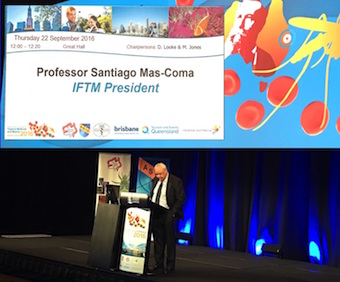
Santiago Mas-Coma, professor of Parasitology in the UV, has chaired the International Congress for Tropical Medicine and Malaria (ICTMM) held in Brisbane, Australia. The scientific meeting, hold each four years, has analysed and examined the response to epidemics such as Ebola, schistosomiasis, dengue, chikungunya and Zika, and also to virus infections of bird flu and swine fever, among other emerging diseases.
“These diseases are phenomena inherent to climate change and to global change, and analyses suggest that this cadence of outbreaks will continue in the immediate future”, says Santiago Mas-Coma, president of the International Federation for Tropical Medicine.
Among the priorities established in the congress for the next four years it has been agreed to increase the cooperation with United Nations agencies with responsibilities for health. It is the World Health Organization (WHO), the Food and Agriculture Organization (FAO), the UNESCO, the World Organization for Animal Health (OIE) or the International Atomic Energy Agency (IAEA).
Another of the aims of the congress, according to Santiago Mas-Coma, is to make “an effort to cooperate with the different mass media to provide the appropriate information to citizens all over the world.”
“The contributions of the conference have embraced all the diseases of tropical or subtropical origin and the situations that it is posing in countries throughout the world. These diseases are expanding to areas considered as temperate zones, what is leading to completely new situations”, according to the professor of Parasitology of the UV.
In this sense, the professor gives the example of the diseases of the refugees in Germany, where these diseases had been eradicated for decades, and German doctors and hospitals are not prepared now for a rapid response. “Despite the appreciable progresses of our technology, these diseases are resistant to be controlled and we are still far from eradicating or eliminating them.”, according to Mas-Coma.
On assertions by the president of the International Federation for Tropical Medicine, the progress against the various diseases is varied. “For example, on schistosomiasis, in concrete areas of Endemic in Africa serious efforts need to be done for not to get discouraged, because no set of measures seems to be effective. On dengue, the vaccines into use are giving problems, such as the people vaccinated have a harder time when they become infected than those unvaccinated. This means that the achievement of a vaccine against Zika would be probably more complex than we anticipated.
Moreover, according to Mas-Coma, when it comes to malaria, surveys show the difficulties to cut the transmission of the disease. Also the resistance to the available anti-malarial drugs and against the Anopheles mosquitoes are expanding. In addition, all the indications are that an effective vaccine against Malaria is still far, despite the diverse initiatives.”
Proposals in Tropical Medicine
In the congress held in Australia this September, the International Federation has decided to expand the number of members of its Steering Committee to have at least a representative in each and every world regions. “It had never been presented an expansion of this scope, but we all agree that this is something more than convenient but also necessary to have a faster responsiveness and more localised capacity to assist than we have now”, has explained Mas-Coma.
The International Federation for Tropical Medicine has decided that the next International Congress, in 2020, will be held in Bangkok (Thailand).
Last update: 11 de october de 2016 10:31.
News release



















